新概念第一册第71课
新概念英语第一册第71课一般过去时
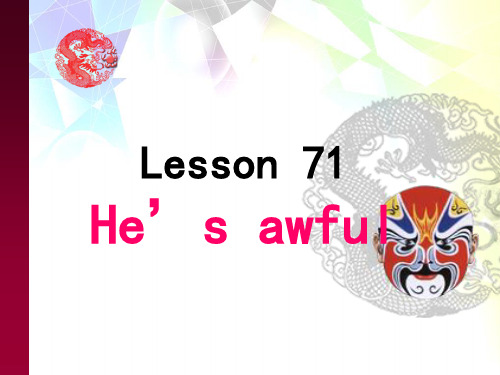
say (said )
V.
说
你跟她说什么了? What did you say to her ? say sth to sb 和某人说了什么事 Can I go ,Mum?Please say yes! speak with sb (spoke) Can I speak with you for a minute?
yesterday the day before yesterday yesterday morning the day before yesterday in the morning the day before yesterday in the afternoon yesterday afternoon yesterday evening the day before yesterday in the evening last night the night before last today this morning this afternoon this evening tonight
• • • • • •
What„s Ron Marston like? what‟s someone like? 询问某人或某物怎么样?(问内在) What‟s the weather like yesterday? It was windy and rainy. What‟s your little sister like? She‟s cute and clever.
他们昨天晚上给我打电话了。
They telephoned me last night. They didn't telephone me last night. Did they telephone you last night? Yes,they did. No, they didn't. What did they do last night?
新概念第一册第七十一课
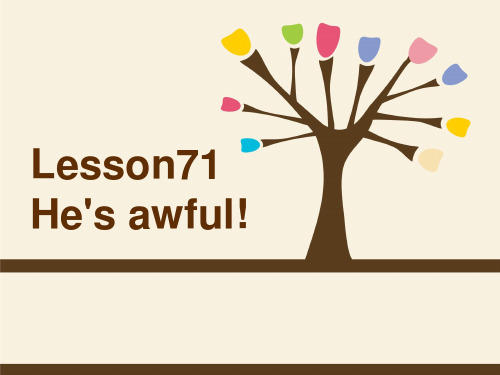
.
本课重点语法 do句型 行为动词变一般过去时的构成
1.一般在动词后直接加-ed) answer-answered wait---waited
.
Retell the text
.
Text analysis & Grammar points
.
语
1、概念:
法
过去时间发生的动作
回
或存在的状态。
顾
(一)
.
一般过去时(I)
语 法 回 顾 (一)
构成1:(过去时间存在的状态)
be 的过去式是was 和were, was 用于第一人称和第三人称单数, were用于其他人称.
.
Lead-in
.
.
New words and expressions
.
['ɔːfʊl] ['telɪfəʊn] [taɪm] ['ɑːnsə]
awful
awful truth
telephone mobile telephone
time answer
many times
answer the telephone
[lɑːst] [fəʊn] [ə'ɡɛn] [seɪ]
last phone again
say
at last phone number never again say what
Listening&Comprehension
新概念英语第一册第71课一般过去时(ppt课件)
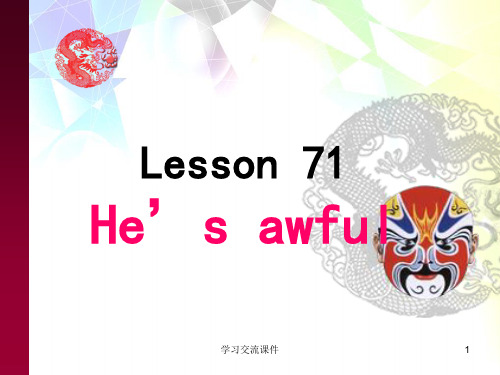
学习交流课件
7
他们昨天晚上给我打电话了。
They telephoned me last night. They didn't telephone me last night. Did they telephone you last night? Yes,they did. No, they didn't. What did they do last night?
学习交流课件
8
awful adj. 让人讨厌的,坏的
• The weather was awful. • It is a really awful book. • You look awful , what's wrong with you ? • Alice is awful!
学习交流课件
9
telephone v./n. 打电话,电话 • telephone sb=phone sb=call sb (up) • 给某人打电话 • I was on the telephone when she
学习交流课件
11
answer v./n. 接(电话),回答
• What is the answer to the question?
• 她了吗? • answer thetelephone • 接电话
学习交流课件
12
phone n. 电话
学习交流课件
13
again adv. 又一次
• once again 再来一次
学习交流课件
24
He telephoned me four times yesterday and three times the day before yesterday.
新概念英语第一册71课课文
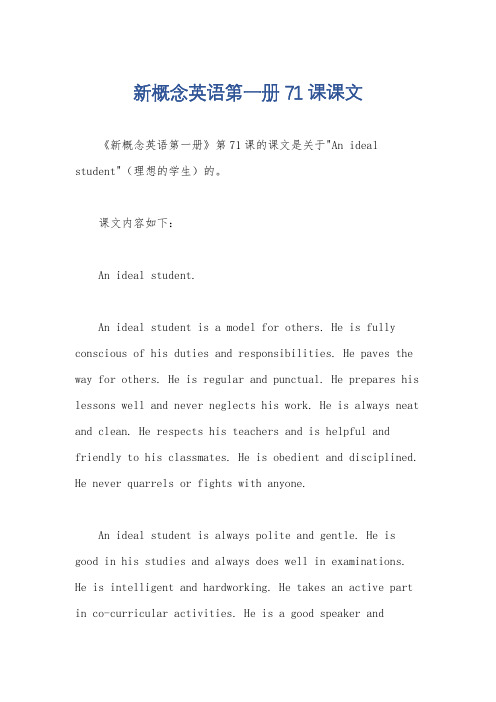
新概念英语第一册71课课文《新概念英语第一册》第71课的课文是关于"An ideal student"(理想的学生)的。
课文内容如下:An ideal student.An ideal student is a model for others. He is fully conscious of his duties and responsibilities. He paves the way for others. He is regular and punctual. He prepares his lessons well and never neglects his work. He is always neat and clean. He respects his teachers and is helpful and friendly to his classmates. He is obedient and disciplined. He never quarrels or fights with anyone.An ideal student is always polite and gentle. He is good in his studies and always does well in examinations. He is intelligent and hardworking. He takes an active part in co-curricular activities. He is a good speaker anddebater. He is also good in sports and games. He is a well-rounded personality.An ideal student is ambitious and has a clear vision of his future. He sets goals for himself and works hard to achieve them. He is focused and determined. He knows the importance of education and strives for excellence in his academic pursuits. He is self-motivated and never gives up easily.An ideal student is not only concerned about his own growth but also about the welfare of others. He is kind and compassionate. He helps those in need and participates in social service activities. He is aware of the issues and challenges faced by society and actively contributes to its betterment.In conclusion, an ideal student is a role model for others. He possesses qualities like discipline, dedication, intelligence, and compassion. He strives for excellence in all aspects of life and works towards personal growth as well as the betterment of society.以上是《新概念英语第一册》第71课的课文内容。
新概念1第71课

构成2:行为动词,表示过去某一时间发生的动作
行为动词变一般过去时的构成
1.一般在动词后直接加-ed
answer-answered wait---waited
2.以不发音的e结尾的动词直接加_dtelephone---telephoned arrive---arrived
3.以辅音加y结尾的,把y改为i,再加ed empty--emptied
2.对……作出反应;响应
answer the phone/telephone
接电话
answer the door/doorbell
应声开门
Mary took a few minutes to answer the door. 玛丽拖了几分钟时间才去开门。
n. 答案 ,办法 Do you know the answer to Question 10? 你知道问题10的答案吗? This is the only answer to this problem. 这是解决这个问题的唯一办法。
2.speak to sb. 与某人说话 May I speak to Pauline, please? I'd like to speak to Pauline, please. 在电话中回答:This is….
一般过去时 II
概念:过去时间发生的动作或存在的状态。
构成1:be动词,表示过去时间存在的状态 be 的过去式是was 和were,was 用于第一人称和第三人称单数,were用于其他人称, 如:We were there at four o'clock.(P140) Were you at the butcher's?(P133) I was at home on Saturday.(P136)
新概念一册71

Say it again!
再说一次
Over The Rainbow.mp3
这个讨厌的人总是给我打电话!
3. time
1) n. 次(数)可数名词
基数词+ times(复数) 用于三次、三次以上 three times 三次 four times 四次
once 一次 twice 两次 eg: He telephoned me three times this morning .
他今天上午给我打了三次电话。
序数词 + time (单数) 表示第几次
The first time 第一次 The second time 第二次 The third time 第三次
2) time 表时间 (不可数名词) eg: Do you have time ? 你有时间吗?
time 的有关词组
On time 准时 in time 及时 all the time 一直
4.anБайду номын сангаасwer
对….做出反应,响应 eg: Who answer the door ? 谁开的门 ?
2)v. 回答;答复
1) v.
eg: Who can answer my question ? 词组: answer the letter 回信
2)awful +ly 成副词
非常;极为 = very much
eg: It’s awfully hot today! 今天天气极热!
2. telephone 1) n. 电话机 2) n. 电话 eg:answer the telephone 3) v. 打电话 eg: the awful man always telephones me !
新概念英语第一册第71课71440
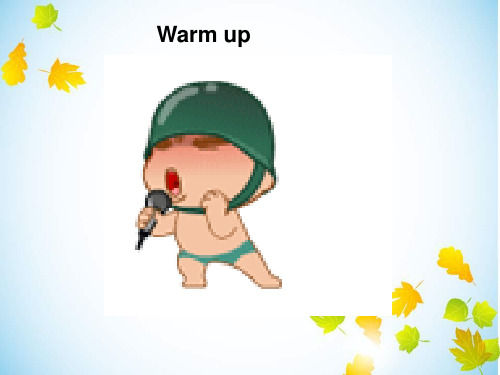
一般过去时的练习
air----aired clean---cleaned open---opened
sharpen---sharpened turn on---turned on
Listen---listened boil---boiled arrive----arrivedΒιβλιοθήκη play---played
例如:What are you talking about? 你们正在谈论什么? say 指说的具体内容,后面可接to sb.,指对某人说。 例如:Please say it again. 请把它再说一遍。 “Go out!” she said to me angrily. “滚出去!”她生气地对我说。 speak 指说某种语言,后面可以接to sb.,指和某人说话 例如:I can speak Japanese. 我会说日语。 May I speak to Mr. Black? 我可以和Black 先生说话吗? tell 主要是指告诉,短语:tell sb. sth. = tell sth. to sb. 告诉某人某 事
Warm up
Lesson 71 He’s awful!
key points
I.Key words
1 awful ['ɔ:ful] ad.让人讨厌的,坏的 2 telephone ['telifəun] v.& n.打电话 3 time [taim] n.次(数) 4 answer ['ɑ:nsə] v.接(电话) 5 last [lɑ:st] a.最后的,前一次的 6 phone [fəun] n.电话(=telephone) 7 again [ə'gein] ad.又一次地 8 say [sei] v.说
新概念英语第一册第71课教学内容

一般过去时
yesterday yesterday morning yesterday afternoon yesterday evening last night the day before yesterday the day before yesterday in the morning the day before yesterday in the afternoon the day before yesterday in the evening the night before last
记
2.以不发音的e结尾的动词直接加_d
哦!
telephone---telephoned arrive---arrived
3.以辅音加y结尾的,把y改为i,再加ed
empty--emptied
4.不规则动词have-had forget-forgot
say-said go-went run-ran
do-did take -took
Test time
Revision
phone awful
time
anga[i'telif[ə'ɔul:anf]ustle[]əle'gpehino]ne
[sei] [fəun]
[taim] t answer
['ɑ:nsə]
[lɑ:st]
say
awful adj. 让人讨厌的,坏的 例如:他很讨厌 He's awful!
Key words:
一般过去时的构成:
陈述句:主语+动词过去式+其他 主语+be动词过去式+其他 He arrived home at six o’clock yesterday evening. We were students three years ago
- 1、下载文档前请自行甄别文档内容的完整性,平台不提供额外的编辑、内容补充、找答案等附加服务。
- 2、"仅部分预览"的文档,不可在线预览部分如存在完整性等问题,可反馈申请退款(可完整预览的文档不适用该条件!)。
- 3、如文档侵犯您的权益,请联系客服反馈,我们会尽快为您处理(人工客服工作时间:9:00-18:30)。
The day before yesterday The day before yesterday
in the morning
The day before yesterday in the afternoon
The day before yesterday in the evening
The night before last
10
一般过去时
1.) 肯定句:主语+动词过去式+其它
如:He telephoned me four times yesterday.
2.) 否定句:主语+didn’t+动词原形+其它 如:He didn’t telephone me four times
yesterday.
11
一般过去时
3.) 一般疑问句及其回答:
7
翻译练习
TOM是怎样一个人? 他讨厌透了. 他昨天给我打了4次电话. 前天打了3次. 他又打了没有? 没有
8
一般过去时
概念:表示过去某一时间发生的动作 或存在的状态,通常以动词的过去式 表示,其否定句和各种疑问句靠助动 词did构成。
9ห้องสมุดไป่ตู้
一般过去时
1.一般在动词后直接加-ed) answer-answered wait-waited
Yesterday yesterday morning yesterday afternoon yesterday evening Last night
18
过去时句型中常出现的时间状语
Yesterday yesterday morning yesterday afternoon yesterday evening Last night
课堂练习
3
复习一般过去时
你星期一在肉店吗? Were you at the butcher’s on Monday? 你星期日在家吗? Were you at home on Sunday? 你星期三在办公室吗? Were you at the office on Wednesday?
kitchen. (Lesson 25,26,27,28) There are two tables in the middle of
the kitchen.
15
There be句型的过去式
There is an ice cream man. There was an ice cream man.
New Concept English Book One
Lesson 71 & 72
贾艳春 Jenny
1
Teaching objectives (教学目标)
句型: what is 某人 like?
contents
规则动词的过去时用法
2
Teaching procedure (教学过程)
复习
步骤
课文讲解
➢When did he telephone you? ➢ He telephoned me yesterday. ➢What did he do yesterday? ➢He telephoned me yesterday.
13
Be动词的过去式
14
There be句型的过去式
There is an ice cream man. (Lesson 19) There is a table in the middle of the
课文讲解 Listen to the tape and answer the
question: How did Pauline answer the telephone at nine o’clock? 071&072-He's Awful.mp3
6
New words
Awful Telephone/ phone Time Answer Last Phone Again say
did +主语+动词原形+其它?句末用问号。 肯定回答:Yes, …did. 否定回答:No, …didn’t.
➢Did he telephone you four times yesterday? ➢Yes, he did . / No, he didn’t.
12
一般过去时
4.) 特殊疑问句: 特殊疑问词+ did +主语+动词原形+其 它?句末用问号。
2.以不发音的e结尾的动词直接加_d telephone-telephoned arrive-arrived
3.以辅音加y结尾的,把y改为i,再加ed empty—emptied
4.不规则动词have-had , say-said, go-went, runran do-did, take -took
There are two tables in the middle of the kitchen.
There were two tables in the middle of the kitchen.
16
There be句型的过去式
There was an ice cream man. There wasn’t an ice cream man. Was there an ice cream man?
19
其他语言点
What is…like? 某人/某物怎么样? What is the weather like in spring? What is the climate like in your country?
There were two tables in the kitchen. There weren’t two tables in the kitchen. Were there two tables in the kitchen?
17
过去时句型中常出现的时间状语
Today this morning This afternoon This evening tonight
4
复习一般过去时
他周二没来上学. He was absent from school on Tuesday. 他周日在教堂. He was at church on Sunday. TOM周六在理发店. Tom was at the hairdresser’s on
Saturday.
5
